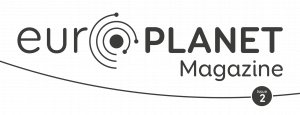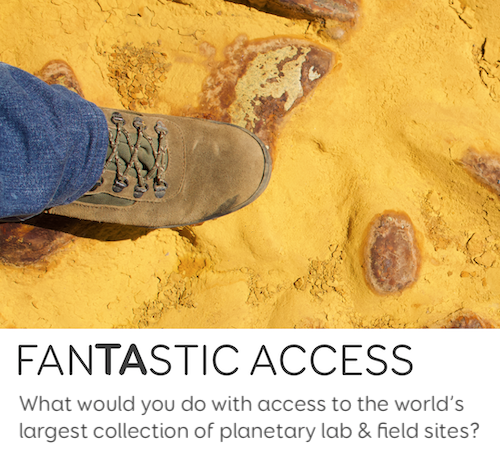Issue 2 of the Europlanet Magazine is out!
The official magazine of Europlanet, the European community for planetary science.
We are delighted to share with you the second issue of the Europlanet Magazine. The e-magazine is published twice a year and aims to highlight the range of activities by Europlanet, our partners, and the wider planetary community.
The second issue highlights some of the exciting science supported through Europlanet’s Transnational Access programme, including an experimental project to recreate martian flows in the lab, field campaigns in Botswana and Greenland, and virtual access to facilities in Korea. Niklas Nienass MEP shares his vision for Europe’s role in the new Space Race, and we report on the science presented and community events at the Europlanet Science Congress (EPSC) 2021 in September. As the Europlanet 2024 Research Infrastructure (RI) passes a major milestone, we look at some of the outcomes of the projets to date, and we have an insight into the long pathway that’s led to the recent selection of three missions to Venus. We also have features on designing meetings in pandemic and post-pandemic times, outreach initiatives, an industry database with links to planetary science, and searching for evidence of the earliest forms of life on Earth.
Please check out Issue 2 and share with your networks to help us spread the word.
In this issue:

A round up of news from Europlanet 2024 RI, the Europlanet Society, the Europlanet Science Congress (EPSC) 2021 and the planetary community.
Celebrating Science at EPSC2021
Stavro Ivanovski (INAF) and Akos Kereszturi (Konkoly Thege Miklos Astronomical Institute), Co-chairs of the Scientific Organising Committee (SOC), review the second virtual Europlanet Science Congress.
Spotlight on Diversity at EPSC2021
The Europlanet Diversity Committee describes events at EPSC2021 to highlight equity, diversity and inclusion.
Early Career Events at EPSC2021
Noah Jäggi, Chair of the EPEC@EPSC Working Group, reports on a packed programme at EPSC2021 organised by the Europlanet Early Career (EPEC) network.
Designs on Pandemic and Post-Pandemic Meetings: Learning with the EPSC 2021 Team
Amy Riches (University of Edinburgh, UK, and SETI Institute, USA) describes her experiences as a planetary geochemist diving into the EPSC2021 Media Internship Programme.
Planetary Perspectives
Lena Noack, Incoming Chair of EPSC2021, talks about her career, inspirations, and her experiences with Europlanet in this month’s Planetary Perspectives Q&A.
Finding New Ways of Envisioning Venus
Jörn Helbert (DLR) looks forward to three new missions to investigate Earth’s mysterious twin.
Connecting Communities Across the Industry – Academic Divide
Marcell Tessenyi (Blue Skies Space Ltd) and Jeronimo Bernard-Salas (ACRI-ST) report on a survey and new database to support industry-academia collaborations.
Europe and the New Space Race
Following the Industry-Policy Session at EPSC2021, Livia Giacomini (INAF) spoke to Niklas Nienass, a Member of the European Parliament (MEP) for Germany in the Group of the Greens/European Free Alliance, about his vision for space science in Europe.
FANTASTIC ACCESS
As we emerge from nearly two years of restricted travel, Gareth Davies (VUA, Netherlands) gives an update on Europlanet’s Transnational Access (TA) programme, which provides free access to facilities and field sites around the world. Lonneke Roelofs (Utrecht University, Netherlands), Daniel Toledo (INTA, Spain), Costanza Rossi (INAF, Italy), Denice Borsten and Jochem Sikkes (VUA, Netherlands) share their expriences of participating in TA visits.
The Animated Universe of James O’Donoghue
Federica Duras and Livia Giacomini (INAF) talk to the Europlanet Prize 2021 winner, James O’Donoghue, about his motivations for creating animations to communicate challenging scientific concepts and his advice on a career in planetary science
Evaluating the Impact of Europlanet 2024 RI
Project Evaluator, Jennifer DeWitt, and Communications Manager, Anita Heward, report on outcomes of the first review of Europlanet’s flagship research infrastructure.
Looking for the earliest forms of life on Earth
Barbara Cavalazzi (University of Bologna) describes how an international effort has identified some of the earliest examples of life on Earth.
The Bolivian San Agustin Remote Observatory
Gabriel Andres Jaimes Illanes, the IAU National Education Coordinator for Bolivia and member of the San Agustin Educational Foundation (FESA), reports on plans to develop a remote observatory to support astronomy outreach in Bolivia.
CommKit
The Europlanet Magazine’s column on science communication by Shorouk Elkobros (Europlanet Society/ESF).
The Last Word
Nigel Mason reflects on a challenging year in Beyond Borders.



